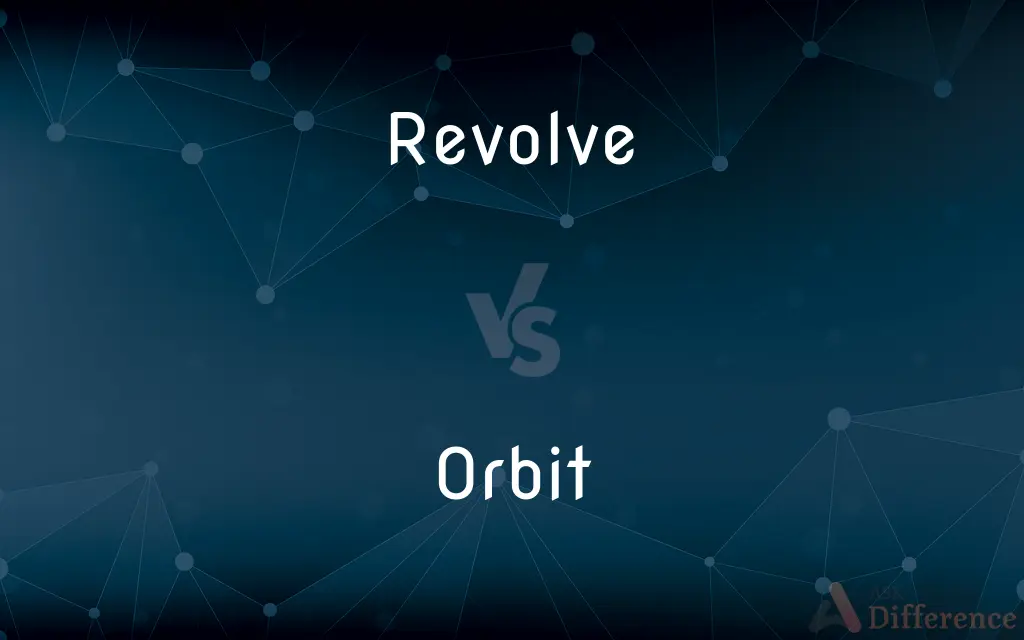Revolve vs. Orbit — What's the Difference?
Edited by Tayyaba Rehman — By Urooj Arif — Updated on May 8, 2024
Revolve refers to an object turning around an axis or center, often on itself; orbit denotes an object traveling in a path around another object, influenced by gravitational forces.

Difference Between Revolve and Orbit
Table of Contents
ADVERTISEMENT
Key Differences
Revolve is the action of an object spinning around its own axis or center point, commonly used to describe the motion of celestial bodies like Earth. Whereas, orbit is specifically the path that an object takes as it moves around another object in space, typically under the influence of gravity.
When the Earth revolves, it does so around its own axis, resulting in day and night. On the other hand, when the Earth orbits, it moves around the Sun, which is responsible for the seasons and the year's length.
Revolving can occur without the influence of external forces, as seen in a spinning top. Whereas orbiting involves the gravitational pull between at least two objects, such as a satellite orbiting the Earth.
Revolve is often used in more general terms and can apply to objects in various contexts, not just astronomical. Whereas orbit is almost exclusively used in the context of astronomy or situations where gravity-induced paths are involved.
The speed of revolution can vary independently of external bodies. Whereas the speed of an orbit is determined by the mass of the objects involved and the distance between them.
ADVERTISEMENT
Comparison Chart
Definition
Spinning around an axis or center
Path around an object under gravity
Dependence
Can be independent
Dependent on gravitational forces
Usage Context
General, various applications
Mostly astronomical
Example Objects
Earth, wheels, toys
Planets, satellites, moons
Resulting Motion
Rotational
Path-dependent, often elliptical
Compare with Definitions
Revolve
To move in a circular or curving course.
The dancers revolved gracefully on the stage.
Orbit
A sphere of influence or activity.
The company's orbit expanded to include international markets.
Revolve
To turn around a central point.
The Earth revolves on its axis once every 24 hours.
Orbit
A regular, repeating trajectory through space.
Comets have long and often irregular orbits.
Revolve
To focus attention around a central theme.
The discussion revolved around the topic of sustainability.
Orbit
To make a complete circuit.
The space station orbits Earth every 90 minutes.
Revolve
To orbit a central point.
The moon revolves around Earth.
Orbit
The curved path of one object around another due to gravity.
The moon’s orbit around Earth takes about 27 days.
Revolve
To come back around in a cycle.
Fashion trends often revolve through the decades.
Orbit
To follow a path around a central body.
Satellites orbit the Earth continuously.
Revolve
To orbit a central point
The planets revolve around the sun.
Orbit
In physics, an orbit is the gravitationally curved trajectory of an object, such as the trajectory of a planet around a star or a natural satellite around a planet. Normally, orbit refers to a regularly repeating trajectory, although it may also refer to a non-repeating trajectory.
Revolve
To turn on an axis; rotate.
Orbit
The curved path of a celestial object or spacecraft round a star, planet, or moon, especially a periodic elliptical revolution
The Earth's orbit around the sun
Revolve
To be arranged as revolving credit
His credit line revolves.
Orbit
An area of activity, interest, or influence
Audiences drawn largely from outside the Party orbit
Revolve
To be centered
Their troubles revolve around money management.
Orbit
The cavity in the skull of a vertebrate that contains the eye; the eye socket.
Revolve
To cause to revolve.
Orbit
(of a celestial object or spacecraft) move in orbit round (a star or planet)
Mercury orbits the Sun
Revolve
To ponder or reflect on
Revolved the matter in his mind.
Orbit
The path of a celestial body or an artificial satellite as it revolves around another body due to their mutual gravitational attraction.
Revolve
To bring back into a particular place or condition; to restore.
Orbit
One complete revolution of such a body.
Revolve
(transitive) To cause (something) to turn around a central point.
Orbit
The path of a body in a field of force surrounding another body; for example, the movement of an atomic electron in relation to a nucleus.
Revolve
(intransitive) To orbit a central point (especially of a celestial body).
The Earth revolves around the sun.
Orbit
A range of activity, experience, or knowledge.
Revolve
(intransitive) To rotate around an axis.
The Earth revolves once every twenty-four hours.
Orbit
A range of control or influence
"What magnetism drew these quaking ruined creatures into his orbit?" (Malcolm Lowry).
Revolve
(intransitive) To move in order or sequence.
The program revolves through all the queues before returning to the start.
Orbit
Either of two bony cavities in the skull containing an eye and its external structures. Also called eye socket.
Revolve
To ponder on; to reflect repeatedly upon; to consider all aspects of.
Orbit
To move in an orbit.
Revolve
To read through, to study (a book, author etc.).
Orbit
To revolve around (a center of attraction)
The moon orbits Earth.
Revolve
(theater) The rotation of part of the scenery within a theatrical production.
Orbit
To put into an orbit
The space agency orbited a new satellite.
Revolve
(theater) The rotating section itself.
Orbit
(astronomy) A circular or elliptical path of a celestial object or spacecraft around a star, planet, moon, or Lagrange point, especially a periodic elliptical revolution.
Revolve
(obsolete) A radical change; revolution.
Orbit
One complete circuit round an orbited body.
The Moon's orbit around the Earth takes nearly one month to complete.
Revolve
To turn or roll round on, or as on, an axis, like a wheel; to rotate, - which is the more specific word in this sense.
If the earth revolve thus, each house near the equator must move a thousand miles an hour.
Orbit
(uncountable) The state of moving in an orbit.
Revolve
To move in a curved path round a center; as, the planets revolve round the sun.
Orbit
(physics) The path of an electron around an atomic nucleus.
Revolve
To pass in cycles; as, the centuries revolve.
Orbit
(pinball) A path for the ball on the outer edge of the playfield, usually connected so that the ball entering in one end will come out of the other.
Revolve
To return; to pass.
Orbit
A sphere of influence; an area or extent of activity, interest, or control.
In the post WWII era, several eastern European countries came into the orbit of the Soviet Union.
The convenience store was a heavily travelled point in her daily orbit, as she purchased both cigarettes and lottery tickets there.
Revolve
To cause to turn, as on an axis.
Then in the east her turn she shines,Revolved on heaven's great axile.
Orbit
(anatomy) The bony cavity in the skull of a vertebrate containing the eyeball.
Revolve
Hence, to turn over and over in the mind; to reflect repeatedly upon; to consider all aspects of.
This having heard, straight I again revolvedThe law and prophets.
Orbit
(zoology) The area around the eye of a bird or other animal.
Revolve
Turn on or around an axis or a center;
The Earth revolves around the Sun
The lamb roast rotates on a spit over the fire
Orbit
(mathematics) A collection of points related by the evolution function of a dynamical system. Category:en:Curves
Revolve
Move in an orbit;
The moon orbits around the Earth
The planets are orbiting the sun
Electrons orbit the nucleus
Orbit
The subset of elements of a set X to which a given element can be moved by members of a specified group of transformations that act on X.
Revolve
Cause to move by turning over or in a circular manner of as if on an axis;
She rolled the ball
They rolled their eyes at his words
Orbit
(informal) A state of increased excitement, activity, or anger.
Dad went into orbit when I told him that I'd crashed the car.
Orbit
(astronomy) To circle or revolve around another object or position.
The Earth orbits the Sun.
The satellite orbits the Lagrange point.
Orbit
To place an object (e.g. a satellite) into an orbit around a planet.
A rocket was used to orbit the satellite.
Orbit
To move around the general vicinity of something.
The harried mother had a cloud of children orbiting her, begging for sweets.
Orbit
To move in a circle.
Orbit
(transitive) To center (around).
Orbit
To continue to follow and/or engage with someone via social media after breaking up with them.
Orbit
The path described by a heavenly body in its periodical revolution around another body; as, the orbit of Jupiter, of the earth, of the moon.
Orbit
An orb or ball.
Roll the lucid orbit of an eye.
Orbit
The cavity or socket of the skull in which the eye and its appendages are situated.
Orbit
The skin which surrounds the eye of a bird.
Orbit
The (usually elliptical) path described by one celestial body in its revolution about another;
He plotted the orbit of the moon
Orbit
A particular environment or walk of life;
His social sphere is limited
It was a closed area of employment
He's out of my orbit
Orbit
An area in which something acts or operates or has power or control:
The range of a supersonic jet
The ambit of municipal legislation
Within the compass of this article
Within the scope of an investigation
Outside the reach of the law
In the political orbit of a world power
Orbit
The path of an electron around the nucleus of an atom
Orbit
The bony cavity in the skull containing the eyeball
Orbit
Move in an orbit;
The moon orbits around the Earth
The planets are orbiting the sun
Electrons orbit the nucleus
Common Curiosities
What factors influence the shape of an orbit?
The shape of an orbit is influenced by the mass of the central object, the distance of the orbiting object from the center, and the velocity of the orbiting object.
Is it possible for an object to revolve without orbiting?
Yes, objects can revolve without orbiting if they are spinning around their own axis without circling around another object.
What is geosynchronous orbit?
A geosynchronous orbit is one where a satellite orbits Earth at the same rate that Earth revolves, keeping the satellite over the same geographic location.
Are the terms "revolve" and "orbit" interchangeable in scientific contexts?
In scientific contexts, these terms are not interchangeable as they describe different motions and involve different forces.
What is the difference between a stable and unstable orbit?
A stable orbit continues without external changes, whereas an unstable orbit changes due to gravitational influences or other forces, potentially leading to a new orbit or ejection from the system.
What are practical applications of understanding orbits in technology?
Understanding orbits is crucial in satellite deployment for communication, weather forecasting, and navigation systems.
How are revolutions per minute (RPM) measured and used?
RPM measures the number of turns around an axis per minute, commonly used to gauge the speed of engines and rotating machinery.
Can an object orbit without revolving?
Yes, an object can orbit another without revolving, meaning it could maintain the same face towards the object it orbits, like the moon does with Earth.
How do orbits affect the climate on Earth?
The Earth’s orbit around the Sun, along with its axial tilt, influences seasonal changes and climate patterns.
What factors affect the speed of an object's revolution?
The speed of revolution depends on the object’s size and the forces acting upon it, such as internal angular momentum.
How does the concept of orbit apply in solar systems other than our own?
In other solar systems, planets and moons also follow orbits around their respective stars and planets, similar to how our solar system operates.
What is an example of a man-made object that revolves?
A Ferris wheel is an example of a man-made object that revolves around a central axis.
What role does mass play in determining the characteristics of an orbit?
Mass is critical as the gravitational force depends on the mass of both the central and orbiting objects; higher mass leads to stronger gravitational attraction and affects the orbit's radius and speed.
What celestial events can disrupt an orbit?
Events like close encounters with other celestial bodies, collisions, and the impact of comets or asteroids can significantly disrupt an orbit.
Can the path of an orbit change naturally?
Yes, the path of an orbit can change due to gravitational interactions with other objects, changes in the mass of the orbiting bodies, or external forces like solar radiation.
Share Your Discovery

Previous Comparison
Browsing vs. Surfing
Next Comparison
Banksia vs. BottlebrushAuthor Spotlight
Written by
Urooj ArifUrooj is a skilled content writer at Ask Difference, known for her exceptional ability to simplify complex topics into engaging and informative content. With a passion for research and a flair for clear, concise writing, she consistently delivers articles that resonate with our diverse audience.
Edited by
Tayyaba RehmanTayyaba Rehman is a distinguished writer, currently serving as a primary contributor to askdifference.com. As a researcher in semantics and etymology, Tayyaba's passion for the complexity of languages and their distinctions has found a perfect home on the platform. Tayyaba delves into the intricacies of language, distinguishing between commonly confused words and phrases, thereby providing clarity for readers worldwide.














































